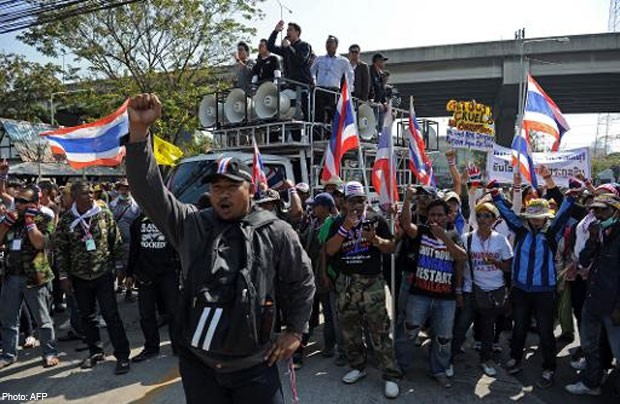Thailand's political crisis: How events might unfold

Thailand's government has set an election for Sunday despite warnings of violence as protesters keep up their efforts to topple Prime Minister Yingluck Shinawatra.
The protesters, who first took to the streets in November, are demanding that the government be replaced by an unelected"people's council" to force through changes to break the hold that former premier Thaksin Shinawatra, Yingluck's brother, has over politics.
Thaksin's passionate supporters, most of whom live in rural areas, have kept away from the Bangkok protests. But they could take to the streets if they feel that, once again, their interests are being dismissed by the Bangkok-based elite.
Below are some possible scenarios:
"JUDICIAL COUP"
Thailand's courts have been unusually active in recent weeks and have taken on several cases centred on attempts by Yingluck's Puea Thai Party to change the constitution.
Some 308 former lawmakers, most of them Puea Thai members, could face a charge of malfeasance in the Supreme Court for trying to amend the constitution to make the semi-appointed Senate a fully elected chamber, which has been ruled illegal.
The Constitutional Court is also handling a case about the legality of allowing international agreements to be made by the government without parliament having a say. The opposition Democrat Party has demanded that Yingluck and her ministers be banned from politics for this.
The National Anti-Corruption Commission is speeding up an investigation into Yingluck over her role as head of the government's rice-support scheme. It has cost the taxpayer billions of dollars and critics say it is rife with corruption.
The politicised courts have banned Thaksin allies in the past and forced pro-Thaksin governments from power, something referred to as "judicial coups". It is unclear what rulings could be handed down in the current cases, but they could include bans on individuals taking part in politics or dissolution of Yingluck's Puea Thai party.
ARMY INTERVENES, ANTI-THAKSIN REGIME INSTALLED
The coup-prone army has tried to stay neutral this time but the generals share the establishment's loathing of Thaksin.
The protests have been mostly peaceful and the government has avoided confrontation. If violence intensifies, even if it is not clear who is responsible, the army could step in and seize power, ostensibly to prevent anarchy.
An interim government could be formed, appointed by judges and senators and approved by the king. Such an establishment-backed government might amend voting arrangements along the lines sought by the protesters, aiming to blunt Thaksin's sway over the electorate, and an election could be held fairly quickly to silence international objections to military rule.
However, some analysts say Thaksin's "red shirt" supporters could rise up if there is a coup or such a transparent move to prevent pro-Thaksin parties winning the next election.
YINGLUCK PARTY WINS ELECTION
The ruling Puea Thai party has been using its vast war chest to promote its populist policies and voters in its rural bastions in the populous north and northeast are likely to turn out in force. Yingluck's party is certain to win with the opposition boycotting the election.
The anti-Thaksin protests might then start to lose momentum and financial support. Backers among the royalist establishment could make a face-saving retreat by agreeing behind the scenes with Thaksin to let his party rule, perhaps on condition he stays in exile.
Yingluck forms a government with promises of reform and compromise. She addresses some of the protesters' grievances - watering down wasteful populist policies and tackling corruption, for instance - to try to pre-empt further confrontation, while distancing the government from Thaksin.
But that will not happen immediately, and the potentially lengthy delay before a new government can be formed could bring further instability.
Because of the inability of some candidates to register, there will not be enough MPs after Sunday's election to open a new parliament and elect a new administration.
There will have to be a number of by-elections to get the numbers up to the quorum, which could take several months. In that period, Yingluck will head a caretaker government, which has only very limited powers and cannot initiate new policy.
YINGLUCK'S PARTY WINS BUT ELECTION IS ANNULLED
Even if Puea Thai wins convincingly, her opponents may not accept the result.
The election campaign will throw up allegations from the anti-Thaksin camp of cheating, irregularities and technical infringements in a bid to derail the ballot.
The Election Commission may decline to endorse the election. Even if it does, legal challenges could be mounted against the result in the courts.
The country would be in limbo and protesters who never accepted the election in the first place could intensify their fight against a caretaker government with no authority to make policy decisions. Military intervention is possible.